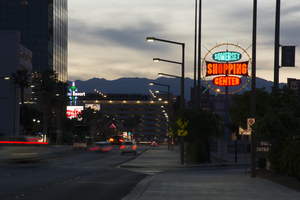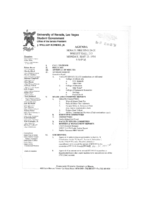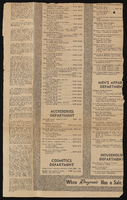Search the Special Collections and Archives Portal
Search Results
Poster boards featuring newspaper and magazine clippings highlighting Hollywood celebrity clothing and poses, 1937 to 1943
Level of Description
Archival Collection
Pagination
- Previous page ‹‹
- Page 7
Archival Component
Jet Pilot, 1948 to 1966
Level of Description
Scope and Contents
The Jet Pilot sub-series (1948-1966) contains material related to the development, production, and post-production of the RKO Radio Pictures film, Jet Pilot (1957). Records include advertising and publicity, censorship, distribution, editing, legal, production and direction, and story development, as well as film soundtracks. Types of materials include newspaper and magazine clippings, billing sheets, pressbooks, paintings, correspondence, editor notes, music scores and sheets, contracts and agreements, daily film and printing reports, and screenplays.
Archival Collection
Pagination
- Previous page ‹‹
- Page 7
Archival Component

Don Perry interview, March 05, 1978: transcript
Date
Archival Collection
Description
On March 5th, 1978, Karen Croteau interviewed Don Perry (b. 1928 in Clarksburg, West Virginia) about Paiute Indians and life on a reservation. Perry begins by mentioning his own Indian heritage with a Cherokee mother and his wife’s Paiute heritage. Perry focuses on his conversations with his wife’s grandmother, who lived on the Paiute reservation since birth, from who he learned about the reservations history. He particularly delves into the traditions of Indian burials, governing on the reservation, and the difference between an Indian reservation and an Indian colony. Additionally, he talks about recreation on the reservations, education of Paiute Indians, and how reservations have changed. Throughout the interview, Perry gives personal anecdotes about his life in connection to the Paiute people and his experiences with their traditions and belief systems. Perry ends by discussing governing politics of the Paiute reservation and the start of Las Vegas as a gambling town.
Text

Photographs of Somerset Shopping Center sign, Las Vegas (Nev.), April 4, 2017
Date
Archival Collection
Description
Site address: 252 Convention Center Dr
Sign owner: Somerset Shopping Center CO LP
Sign details: This shopping center was built in 1966 next to the Somerset House Motel. The motel was demolished in 2011; however, the shopping center is still around. Some businesses that reside in the shopping center include: a hair and nail salon, a dry cleaners, an Ethiopian restaurant, and a place for banquets to name a few.
Sign condition: 5, the sign is in beautiful condition.
Sign form: Pole
Sign-specific description: This pole sign sits close to the street so motorists and pedestrians can view it easily. A light blue pole holds up the main portion of this sign, as well as back lit plastic signs on each side of the pole that display what businesses are in the shopping center. The sign itself consists of a yellow ring that encircles three other signs. This yellow circle is covered in incandescent light bulbs that chase when the sign is lit up at night. Also, extending from this yellow circle are light blue poles in various lengths that are surrounded in neon tubes and oscillate around the yellow circle when the sign is lit up at night. In the center of the circle are three signs. The first sign is an elongated oval that has the word "SOMERSET" painted on it in bold white letters with a black outline on a light blue background. Neon tubes outline these letters. The sign under that is a large rectangle shape with each of the sides curving inward. There are also incandescent light bulbs lining the outer edge of this sign that chase when the sign is lit up. This sign has the word "SHOPPING" painted on it in bold white text against a red background. Neon tubes outline each letter of this word. The sign under this is another elongated oval that is a similar size to the "SOMERSET" sign. This sign reads "CENTER" in bold white text against a red background and neon tubes outline this word as well.
Sign - type of display: Neon, Incandescent light bulbs and back lit
Sign - media: Steel and plastic
Sign - non-neon treatments: Plastic portion of sign
Sign animation: Oscillating, chasing
Sign environment: The shopping center that this sign is located in is about a block away from the Strip and is near a few monumental properties. It resides close to the Las Vegas Country Club, the Las Vegas Convention Center, and the Guardian Angel Cathedral that Paul Revere Williams designed. It is down the road from casinos like the Wynn, Encore, Circus Circus, and the Westgate. The Peppermill, an iconic Las Vegas restaurant, is down the street as well. It was down the street from the Stardust when that property was up and running.
Sign manufacturer: YESCO
Sign - date of installation: Most likely 1966, 1960's era
Sign - thematic influences: The design of this sign is very eye-catching from the road, as are many roadside signs throughout this era of the city. Bold text and light animation make this a standout sign to attract motorists and pedestrians to the shopping center.
Sign - artistic significance: This sign appears to have some Googie design influence throughout it. It has a space age feel to it because of the yellow circle that surrounds the "SOMERSET SHOPPING CENTER" signs and the blue poles that extend from it also add to this style.
Survey - research locations: Assessor's Page http://www.clarkcountynv.gov/assessor/Pages/searchbybusinessname.aspx , Vintage Las Vegas website http://vintagelasvegas.com/search/somerset , Roadside architecture website http://www.roadarch.com/signs/nvvegas.html
Surveyor: Lauren Vaccaro
Survey - date completed: 2017-09-01
Sign keywords: Neon; Incandescent; Backlit; Steel; Plastic; Oscillating; Chasing; Pole sign
Mixed Content
Galane, Morton Robert, 1926-2001
Morton R. Galane (March 15, 1926-August 21, 2001) was a prominent Las Vegas Attorney, nominee to the federal bench, and owner of his own law firm.
Galane was born in Bronx, New York on March 14, 1926 and moved to Las Vegas in 1952 after he graduated from George Washington University. Upon arriving
in Las Vegas Galane worked for the firm Hawkins and Connon before establishing his own practice in 1955. Galane's career as a lawyer in Las Vegas saw
Person
Siegel, Bugsy, 1906-1947
Benjamin "Bugsy" Siegel (1906-1947) was a well-known Las Vegas, Nevada casino investor and manager, most famously associated with the Flamingo and organized crime. Born Benjamin Siegelbaum in Brooklyn, New York on February 28, 1906, Siegel formed the Bug and Meyer Mob with Meyer Lansky while he was still a teenager. Later, Siegel was a founding member and chief operator of "Murder, Inc.," an organized crime "enforcement" group.
Person

Meeting minutes for Consolidated Student Senate University of Nevada, Las Vegas, May 23, 1994
Date
Archival Collection
Description
Text

